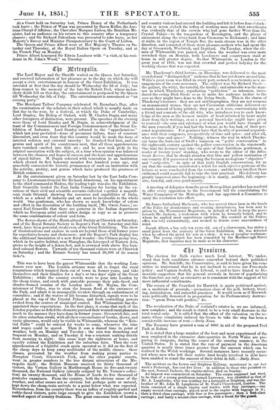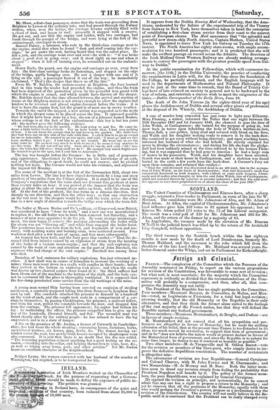tht Vrouturro.
The election for Bath excites much local interest. We under- stand that both candidates advance somewhat beyond their published opinions. Mr. Sutcliffe, the Conservative, is said to have given his com- mittee to understand that he is not inclined to reverse our Free-trade policy : and Captain Scobell, the Liberal, is said to have hinted to De- mocratic supporters that his general avowals in favour of popularizing the franchise are only as extensive as is consistent with the support of his more influential constituents.
The return of Mr. Crawford for Harwich is again petitioned against, on a multitude of grounds,—premature close of the poll, bribery, treat- ing, intimidation, and unlawful practices. It would seem as if Harwich were politically demented in preparation for its Parliamentary destruc- tion: " quern Deus vult perdere," &c.
The revaluation of the Duke of tiutland's estates is, we are informed, now complete ; and the result is stated to be a very small decrease in the total rental only. It is added that the effect of the valuation on the te- nants whose complaints induced his Grace to take the step has been a considerable increase of rent.—Daily News.
The Treasury have granted a sum of 800/. in aid of the proposed Peel Park at Bolton.
It is stated that a large number of the best and most experienced of the men employed in the extensive slate-quarries in North Wales are pre- paring to emigrate, during the course of the ensuing summer, to the United States. It is stated that the rate of payment in the American quarries is nearly three times greater than the amount which can be realized in the Welsh workings. Several instances have recently occur- red where men who left their native land deeply involved in debt have been enabled to remit the amount of their debts in full—Daily News.
The accident on the Lewes and Brighton Railway, mentioned in our last week's Postscript, has cost five lives : in addition to those who perished on the spot, Samuel Jackson, the engine-driver, died on Sunday. An inquest was commenced on Saturday. The corpse supposed last week to be that of a young gentleman named Lawrence, was.identified as that of Mr. A. Langhorne, who was residing for a fortnight at Brighton, and was the brother of Mr. John H. Langhorne of St. Paul's Churchyard, London. The train consisted of a single engine and tender, with four carriages,—one empty second-class carriage, placed next to the engine sirltli luggage in it ; then a third-class carriage, with four or five passengers ; then a met-class carriage; and lastly a second-class carriage, with a brealc.forffie gust. Mr. Shaw, a first-class passenger, states that the train was proceeding from Brighton to Lewes at the ordinary rate, and had passed through the Palmer station, when near the bridge, the carriage became suddenly filled with a cloud of dust, and began to reel : presently it stopped with a swerve. He got out, and saw that the engine and tender, with two carriages, had burst through the parapet of the bridge, and were lying at the foot of the embankment, enveloped in steam.
Samuel Posey, a labourer, who rode in the third-class carriage next to the engine, stated that when lie found " dust and stuff coming into the car- riage,' he got under the seat, having heard that was the safest place. He felt a jerk, and the carriage went over and over—he with it : " it was broke about a good deal in going over ; and it stood right on one end when it , stopped ' : when it left off turning over, he scrambled out on the embank- ment.
Henry Earle, the guard, saw the engine and carriages go over, away from him : the first-class carriage broke its fastenings, and stopped on the edge of the bridge, partly hanging over. He saw a sleeper with one end of it lying on the rail; a passenger heaved it out of the way : he immediately .exclaimed, " That's the sleeper that threw us off the line." From Mr. W. Balchin, the station-master at Brighton, the Jury learned that in this train the tender had preceded the engine, and thus the train had been deprived of the protection given by the powerful iron guard with .which the engine is armed, and which might have thrown off the sleeper. Mr. Balchin stated that the time allowed between the arrival and starting of trains at the Brighton station is not always enough to allow the engines and tenders to be reversed and placed engine-foremost before the trains : it is best to have the engine first, but the guard is of most use in snowy weather.
Towards the end of the inquest, a new notion was suggested as to the mode in which the sleeper came to be placed across the line. It appeared possible that it might have been done by a boy, the son of a labourer named Boakes, whose cottage is at the foot of the embankment : this boy is but ten years old : his mother gave the following evidence.
" He had been playing in the garden. He kept going to and fro. He came in- doors a little before twelve o'clock. For an hour before that. I had seen nothing of him. I do not know for certain that he had been in the garden. His little bro- ther had been out on this side of the rails with him. I called him in to go an errand for me to Ashcombe. He wanted to go out again, and said, ' I must go and see this train, mother, before I go.' I told bun to go his errand. He went out to see the train come in. He seemed very much to wish to see it ; he seemed very anxious to see this train. He did not tell me why. Soon after he ran in, and said—' Oh! mo- -Hier, the train has fell over : what shall we do ?' He seemed very much frightened. He wanted to go to the spot, but I sent him to Ashcombe."
The boy was brought before the Coroner : he is little, and of preposses- sing appearance. Questioned by the Coroner on his knowledge of an oath, and of the obligations to speak truth, he could not answer, and he yielded nothing but tears. The Coroner would not take his evidence, and adjourned the inquest till Monday.
The scene of the accident is at the foot of the Newmarket Hill, about two miles from Lewes. The line has here sloped downwards by a long and steep gradient of two miles from the Palmer station. It is stated to be one of the Company's regulations that the train shall not descend this gradient at more than twenty miles an hour : it was proved at the inquest that the train was going at about the rate of twenty-three miles an hour, with the steam shut off. At the foot of the gradient, the line turns in a sinuous direction, first sharply in one direction, and then the other way; so that any obstruction on the rail next to the sleepers would have sent the train across the other line in a new angle of direction towards the bridge over which the train fell.
The boiler at Messrs. Braine and Co.'s colliery, at Kingswood, near Bristol, was considered to have "done its work," and a new one was manufactured to replace it ; the old boiler was to have been removed last Saturday, and a number of men were appointed to do the job. By some strange mismanage- ment, the men began to remove the masonry surrounding the boiler while the steam was yet "blowing off," and while thus engaged the boiler burst. The ponderous mass was torn from its bed, and fragments of iron and ma- sonry, with scalding water and burning coals, were scattered around. Four workmen died after a few hours of agony, and four more subsequently. An inquest has been held, and the Jury gave this verdict—" That the de- ceased died from injuries caused by an explosion of steam. from the bursting of the boiler of a certain steam-engine ; and that the said explosion was caused by the want of care and attention on the part of John Burchell, the engineer who had charge of the said engine." Burchell was among those who died.
Barnsley, of bad eminence for colliery explosions, has just witnessed an- other. A new shaft was in course of formation to increase the working of a mine; three men went down in a cradle with candles in their hands; before they arrived at the bottom an explosion took place; and when the cradle was drawn up two charred corpses were found in it : the third sufferer had been blown out of the machine to the bottom of the shaft, and the body can- not be recovered till the place is thoroughly ventilated. It is supposed that the fire-damp penetrated some crevice from the old workings of the mine.
A young man named Ship having been arrested on suspicion of stealing seven oxen, a constable purposed taking him from Boxmoor to Leighton Buz- zard by rail. The constable attached the prisoner to himself by a handcuff on the wrist of each, and the couple took seats in a compartment of a car- riage by themselves. In passing Cheddington, the prisoner, a stalwart fellow, rose from his seat, pulled the constable towards the door, and dragged him from the carriage. The prisoner fell uppermost; his captor had broken his leg : by maltreating the officer, the prisoner compelled him to give up the key of the handcuffs, liberated himself, and fled. The wounded man was found shortly after by the railway people : he has refused to have the leg amputated, and is in a state of danger.
A fire on the premises of Mr. Jordan, a farmer of Catworth in Cambridge- shire, has laid waste the whole steading; consuming house, furniture, barns, agricultural produce, six horses, pigs, fowls, &e. The flames having ex- tended across the road, two newly-built houses occupied by shopkeepers were also consumed. It is said that there is no doubt that the fire was wilful. "The labouring population evinced anything but a good feeling on the oc- casion,—breaking into the cellar, and helping themselves to wine, beer, &c., as well as taking away hams, pork, and other articles." Yet Mr. Jordan bears an excellent character in the neighbourhood.
Bridget Lyons, the woman convicted with her husband of the murder at Warrington, but respited, is to be transported for life.



























 Previous page
Previous page